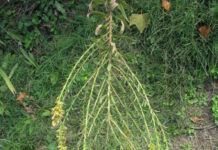Photo credit: DiasporaEngager (www.DiasporaEngager.com).
Tholakhele Nkosi digging a hole with just the head of a pickaxe to put up a support pole for her shack. Photos: Kimberly Mutandiro
- Johannesburg metro police demolished shacks in Rabie Ridge for the sixth time over the weekend.
- About 100 homes were demolished.
- The occupation of the former temporary Covid camp site started in August last year.
- Many occupiers have already rebuilt their homes.
On Saturday, an exhausted Tholakhele Nkosi was digging a hole with just the head of a pickaxe for a support pole for her shack. The day before she had watched as the Johannesburg metro police department (JMPD), for the sixth time, demolished her one-roomed zinc home in Phumla Mqashi informal settlement on Rabie Ridge, near Tembisa.
Her home was demolished twice in September, twice in November, again in February and now in April. This time, law enforcement confiscated her materials. She has no money for zinc sheets and will rebuild with boards from a nearby dumpsite.
The 52-year-old widow has learned how to build her shack on her own.
In August 2023, about 100 families, mostly backyard dwellers, occupied land off Modderfonetin Road, where a temporary shelter had been set up and fenced during the Covid lockdown in an attempt to de-densify informal settlements. Later, thieves cleaned the place out.
The occupiers believed the City would accept their settlement and provide services as it is municipal land. They claim that recently, ANC politicians on the campaign trail told them they were safe.
On 18 April, to their surprise, the JMPD demolished 100 shacks.
Ward 80 Councillor Melody Hlatswayo (ANC) told GroundUp it was an illegal occupation by people from as far as Orange Farm, Hamanskraal and Daveyton, who had heard the land was to be developed.
She said flats were to be built for people in Rabie Ridge who have been waiting for houses for over 30 years. She said there were seven informal settlements in the area and the development would alleviate this.
A community representative, Dineo Mokoena, said, “All we want is to be allowed to live on the land because we have nowhere else to go.”
Mhlaliseni Khumalo, his wife and two children moved here when they could no longer afford rent. He has a disability and says the housing department promised to allocate him a flat in ward 45, but it never happened.
“I lost lots of material during demolitions … It is painful that the government is treating us this way, when we desperately need houses,” he said.
Lindelwa Tshoba has three children and seven grandchildren. She registered for a RDP house in 2004.
“I have been voting all these years, hoping to get a house, but to no avail,” she said. “We are not working; what do they want us to do?”
The City of Johannesburg did not reply to our specific questions but in a joint statement on 5 April, the City and Gauteng govenment said, “Members of the public are warned to resist temptations to illegally invade land and any government property as this will only result in them losing their hard-earned money and investments during evictions.”
“Government will continue to work with the courts, developers, and police to execute eviction orders against these illegal acts of land and house invasions.”
From left to right: Timothy Ndlovu, Mhlaliseni Khumalo and Zandi Ndhlovu.
© 2024 GroundUp. This article is licensed under a Creative Commons Attribution-NoDerivatives 4.0 International License.
You may republish this article, so long as you credit the authors and GroundUp, and do not change the text. Please include a link back to the original article.
We put an invisible pixel in the article so that we can count traffic to republishers. All analytics tools are solely on our servers. We do not give our logs to any third party. Logs are deleted after two weeks. We do not use any IP address identifying information except to count regional traffic. We are solely interested in counting hits, not tracking users. If you republish, please do not delete the invisible pixel.
Source of original article: GroundUp News (www.groundup.org.za).
The content of this article does not necessarily reflect the views or opinion of Global Diaspora News (www.GlobalDiasporaNews.com).
To submit your press release: (https://www.GlobalDiasporaNews.com/pr).
To advertise on Global Diaspora News: (www.GlobalDiasporaNews.com/ads).
Sign up to Global Diaspora News newsletter (https://www.GlobalDiasporaNews.com/newsletter/) to start receiving updates and opportunities directly in your email inbox for free.


































